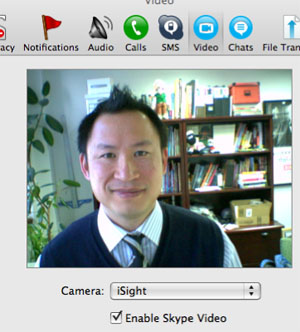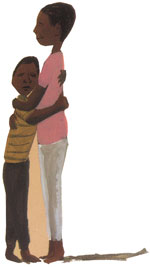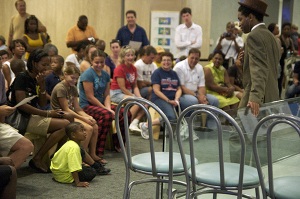 Our very own author/adventurer/world record-breaker Jan Reynolds will be hosting a live, free webinar this Friday from Bali, the site of her award-winning book, Cycle of Rice, Cycle of Life: A Story of Sustainable Farming.
Our very own author/adventurer/world record-breaker Jan Reynolds will be hosting a live, free webinar this Friday from Bali, the site of her award-winning book, Cycle of Rice, Cycle of Life: A Story of Sustainable Farming.
Tag Archives: Educators
We Shall Overcome
Over the weekend I listened to a band called Flame perform at a fundraiser for my youngest son’s school. The school offers a socialization program for special needs kids which my son, who is seven years old and autistic, goes to on weekends. What was unique about the ten members of the band is they all have some form of developmental and/or physical disability.

At the fundraising event, my son was supposed to sing “Three Little Birds” by Bob Marley with the other kids in the program, but he is sensitive to loud noises so he refused to go on stage. While he was sitting on my wife’s lap, I noticed him singing softly to himself during the song, which was good to see since he is usually non-verbal. He even applauded when the song was over.
Being There Without Being There
I did my first Skype visit last week. It was with the students of a publishing course being taught by Simmons College at the Eric Carle Museum in Amherst, Massachusetts, that needed a guest speaker. My visit was scheduled for Friday, which is the dress down day at the office, so I wore a dress shirt with jeans and sneakers and donned the spare tie I keep in the office. I looked presentable from the waist up.

Defending the Book in the Classroom
Recently, I gave a presentation to a college class of future teachers. Their professor asked me: “What advice would you give a teacher who has introduced to her or his class a controversial book that has been challenged by a parent?” I am not sure the answer I gave at the time was a good one, but I have pondered the question some more and would like to offer a few suggestions.
Talk about what the book does well. Point out the main themes of the book and how it is important for today’s children to learn about them in a safe environment. Our book Brothers in Hope: The Story of the Lost Boys of Sudan tells the story of a group of boys who escape the slaughter of their people in Sudan. I recall a reviewer, who was also a mother, stating that her child did not need to worry that she might come home one day and not find her parents there. I am a parent myself, and I can empathize with this sentiment. But being a New Yorker in a post 9/11 world, I know that bad things can happen to good, innocent people close to home. Brothers in Hope keeps the most grisly violence off the page, and while there are scary parts throughout the book, the story does an excellent job of emphasizing the fact that when faced with the most dire of circumstances, the boys organized, stuck together, and looked out for one another. The boys became a family in the absence of family, and what they accomplished is a testament to children’s courage and the inner strength that enabled them to face insurmountable odds and survive. Brothers in Hope is a sad story, but it teaches children about the world we live in and shows that even acts of extreme cruelty can lead to amazing acts of grace.
children to learn about them in a safe environment. Our book Brothers in Hope: The Story of the Lost Boys of Sudan tells the story of a group of boys who escape the slaughter of their people in Sudan. I recall a reviewer, who was also a mother, stating that her child did not need to worry that she might come home one day and not find her parents there. I am a parent myself, and I can empathize with this sentiment. But being a New Yorker in a post 9/11 world, I know that bad things can happen to good, innocent people close to home. Brothers in Hope keeps the most grisly violence off the page, and while there are scary parts throughout the book, the story does an excellent job of emphasizing the fact that when faced with the most dire of circumstances, the boys organized, stuck together, and looked out for one another. The boys became a family in the absence of family, and what they accomplished is a testament to children’s courage and the inner strength that enabled them to face insurmountable odds and survive. Brothers in Hope is a sad story, but it teaches children about the world we live in and shows that even acts of extreme cruelty can lead to amazing acts of grace.
Video Thursday: Everyone’s Reading Yummy
![]() We know we’ve done something right when readers share their excitement for our books with the entire Internet. Amy Cheney, librarian at Alameda County Juvenile Justice Center, is one of those excited readers: she made a video with other staff at the ACJJC, all explaining why they love Yummy and why it’s great for the kids they work with every day.
We know we’ve done something right when readers share their excitement for our books with the entire Internet. Amy Cheney, librarian at Alameda County Juvenile Justice Center, is one of those excited readers: she made a video with other staff at the ACJJC, all explaining why they love Yummy and why it’s great for the kids they work with every day.
Five Ways to Green the Curriculum

![]() Jen Cullerton Johnson is an educator and the author of Seeds of Change: Planting a Path to Peace, a biography of biologist, environmentalist, and activist Wangari Maathai. We asked her to blog about ways teachers can bring awareness of nature and environmentalism into the classroom; here are her five key suggestions. We hope you find them useful, and of course, feel free to add your own suggestions and methods in comments!
Jen Cullerton Johnson is an educator and the author of Seeds of Change: Planting a Path to Peace, a biography of biologist, environmentalist, and activist Wangari Maathai. We asked her to blog about ways teachers can bring awareness of nature and environmentalism into the classroom; here are her five key suggestions. We hope you find them useful, and of course, feel free to add your own suggestions and methods in comments!
Green teachers everywhere know that students can’t become stewards of the environment without hands-on interactions with nature. Describing the root system of plants puts third graders to sleep, but if you bring in several plants and allow the students to feel, see, and discuss, the room becomes atwitter with curiosity. Active learning impresses the mind. Passive learning depresses it. Green teachers facilitate a nature-based experience for their students. In each lesson they teach, in each interaction with their students, they look for ways to connect the environment with other subjects.
A Lunch at the Museum
The odd and the beautiful are photos taken from the streets of New York City, our commutes, and our travels. Sometimes humorous, often times unusual, they offer a taste of life in the big city and beyond.

A YUMMY update
Just popping on the blog to share a little more good news: Yummy has received its fourth (yes, FOURTH!) star, from the Bulletin of the Center for Children’s Books:
A Tip for Surviving School Visits
 Anastasia Suen, author of Toddler Two and Baby Born, visits schools frequently. Here’s one of her tips for surviving a school appearance—based on long experience!
Anastasia Suen, author of Toddler Two and Baby Born, visits schools frequently. Here’s one of her tips for surviving a school appearance—based on long experience!
Video Thursday: Blue Eyes and Brown Eyes
An old but good video this week, featuring a teacher who split classes—here a group of corrections officers being trained—into brown eyes and blue eyes and used that as the basis for (temporary) discrimination:

